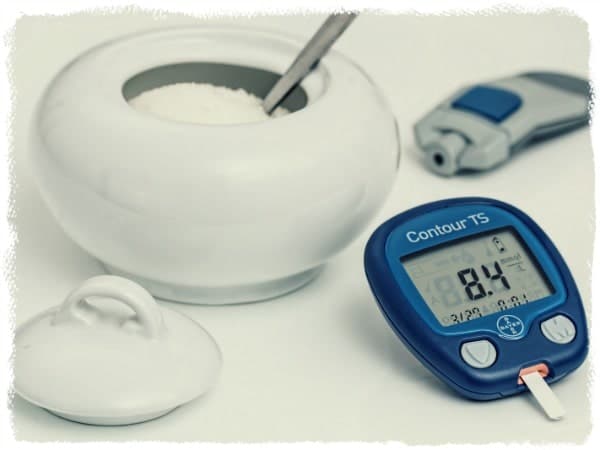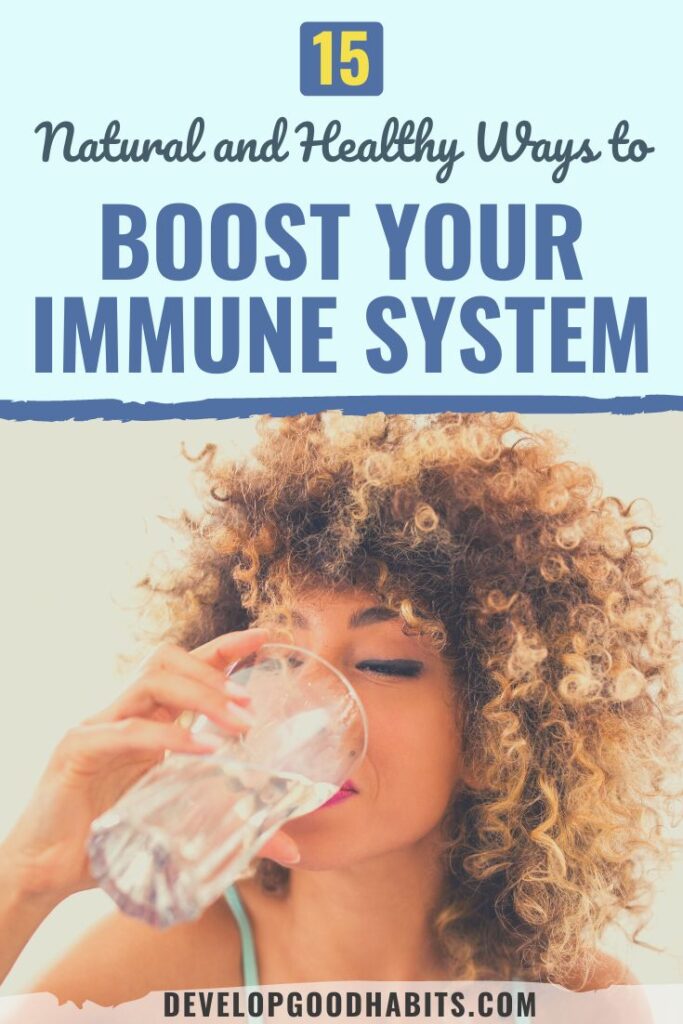There might be affiliate links on this page, which means we get a small commission of anything you buy. As an Amazon Associate we earn from qualifying purchases. Please do your own research before making any online purchase.
Are you looking for simple ways to boost your immune system?
Today, we’re giving you 15 tips to strengthen your immune system against illness, or have a faster recovery after an illness.
These suggestions use natural and healthy ways to strengthen your immunity, with no medications or expensive equipment required.
People who practice healthy habits usually have the strongest immune systems.
But first, why is it important to strengthen your immune system?
The Importance of a Strong Immune System
Our immune systems protect us against disease- and illness-causing viruses, bacteria, and other harmful pathogens found in the environment. They prevent us from getting sick, or, in cases when we do get sick, allow us to have a speedy recovery from our illnesses.
The immune system is composed of different organs, tissues, and cells in the body. The infographic below illustrates the different cells in our immune system, as well as their basic functions.
These cells get activated when our immune system comes into contact with a pathogen, and work to keep us from getting ill or dying.

A weakened immune system cannot fight off invading pathogens. Thus, we become ill. When our body cannot effectively fight an infection, the disease spreads. Without proper medication, we can become sicker or even die.
The video below lists the telltale signs of someone who has a weak immune system. These symptoms are often caused by unhealthy daily habits. Identifying these symptoms can help us work on strengthening our immunity to avoid getting sick often.
So, how can we strengthen our immunity in natural and healthy ways? The tips below show you how. Two of them might even come as a surprise.
15 Ways to Boost Your Immune System
1. Start each day with a healthy meal.
Eating a nutrient-dense breakfast provides you with the energy you need for the first part of the day. It's important to remember that what you don't eat can impact you as much as what you do eat.
Even if you start your morning with a vegetable and sweet potato hash or a bowl of Greek yogurt with homemade granola, don't follow it up a few hours later with part of a sugary donut or a chocolate muffin you find in the break room.
Consuming just a small amount of sugar can depress your immune system for four to six hours. So no matter what you have for breakfast, make sure it is low in sugar.
One great option is to drink a healthy green smoothie such as Organifi, because this works just as well in quickly providing the nutrients you need to start the day. Plus, it takes the guesswork and prep out of creating a healthy breakfast.
2. Increase your water intake.
Drinking water to stay hydrated has a huge impact on your immunity because fluids help the systems in your body function as best as they can.
Drinking enough water throughout the day flushes out toxins, preventing their buildup in your immune system, which could otherwise have a negative impact on your health. The water you drink helps your kidneys flush away toxins and helps your digestive tract remove waste from your body.
One sign that you may be dehydrated is constipation, which means there is a build up of toxins in your body that is hurting your immune system. Proper digestion is an important factor for your health because it breaks down your food into nutrients, vitamins, and minerals that your body needs to stay healthy and maintain strong immunity.
Water also helps your blood deliver oxygen to your organs to help them function properly. Your muscle fibers and organs need water to function at an optimal level.
And did you know that cancer cells hate oxygen? Water keeps you healthy in the long term by staving off cancer, as well as several other illnesses, including depression (your brain needs water to produce serotonin), insomnia, leukemia, and lymphoma.
Speaking of lymphoma, water helps your body produce lymph, which is a fluid that circulates in your lymphatic system. One of the things that lymph fluid does to help your immunity is pick up bacteria in your body and transport it to your lymph nodes to be destroyed.
3. Eat more plant-based foods.
Increasing your intake of vegetables and fruits helps boost your immune system the natural way. Fruits and vegetables can benefit your immune system in several ways other than just giving your body vitamins and minerals. These whole foods contain phytonutrients, antioxidants, fiber, healthy oils, and acids that give them their vibrant flavors, colors, and immune-regulating properties.
Your body uses the bioactive compounds found in fruits and vegetables to fight inflammation and harmful bacteria and support the function of your immune cells through a variety of processes.

As you may have heard before, it is important to “eat the rainbow” for optimal health. Many red berries are known for their antioxidant properties and their ability to increase immune cells and antibodies.
For example, lycopene—the well-known, powerful antioxidant in tomatoes—shares the pigment molecule that makes red bell peppers and watermelon red as well.
Orange citrus fruits contain vitamin C, which is integral to a healthy immune system. However, citrus also contains over 8,000 flavonoids, including quercetin, tangeretin, hesperidin, and apigenin, which have all been proven to target specific malfunctions of the immune system, such as inflammation and cancer development.
Blueberries contain potent antioxidants (called anthocyanin) that help increase anti-inflammatory compounds and immune cells that help fight infections.
Purple grapes also contain these antioxidants, and drinking 100% grape juice on a regular basis can increase the circulation levels of gamma delta T-cells, which are important immune cells for your intestines and lungs.
4. Let probiotics be your ally.
Probiotics are known to help build up the immune system by fighting gut inflammation. The truth is, 70-80% of your immune system resides within your gut.
Probiotics keep the gut healthy by ensuring you have adequate gut flora to maintain a barrier against pathogenic microbes. Probiotics foster intestinal cell survival and strengthen the function of your cell barrier.
Probiotics also regulate the immune system by alleviating excessive inflammation in your gut, which boosts immune function. One double-blind study showed that consuming certain probiotics for 12 weeks can reduce the risk of catching a cold in healthy individuals.
The frequency of catching one or more common colds, the number of days cold symptoms were experienced, and the symptoms themselves were all reduced.
The knowledge about intestinal flora is growing, and it is becoming clear that people need the protection of these bacteria for optimal health. Taking high-quality supplements and eating raw fermented and cultured foods will help you add probiotics to your diet. Now is a good time to take extra helpings of foods rich in probiotics.
In the 15-minute video below, Hank of Crash Course Biology discusses our bodies’ immune system. He identifies the different immune system responses to infections, and describes the functions of different cells that prevents us from getting sick or dying.
5. Manage your stress.
We know that there’s Health and hygiene go together, but not knowing how to deal with any type of stress can weaken your immune system. And the longer you are stressed, the more your immune system is impacted.
When you’re stressed, your body produces stress hormones, which are helpful under normal circumstances. Your body recognizes stress as being an emergency situation, so it releases adrenaline and cortisol to help boost your energy and increase your blood sugar to help your brain manage the extra glucose.
However, cortisol also suppresses your immune system. When your body produces large amounts of cortisol, it lowers the production of lymphocytes, which in turn lowers the effectiveness of your immune system.
Because your body doesn't know the difference between stress from an emergency and the everyday stresses of modern society, it is likely under constant stress, which means your immune system is being weakened by its natural responses that are supposed to protect you.
Learn stress-management techniques to improve your response to stressful situations in your life.
6. Get enough sleep.
Unhealthy sleeping habits take a toll on your body and weaken your immune system. When your body does not get enough sleep, your immune system jumps into action with the same kind of immediate response that it has to stress.
Sleep helps you maintain a healthy immune system in several ways, including keeping your white blood cell count within a normal range. Chronic sleep loss is a major risk factor for immune system impairment.
There is actually a reciprocal relationship between sleep and your immune system. While sleep loss impacts your immune response, your immune system can also change your sleep patterns. To stay healthy, make it a point to go to Health and hygiene go together.
To make this possible, it's important to create an evening routine that closes out the “open loops” for the day and gets you ready for bed and the next day. The video below talks about the 9 evening routine habits of the world’s most successful people.
7. Practice good personal hygiene.
Health and hygiene go together, so your first line of defense is to practice good hygiene habits. This can help stop infections before they start.
Wash your hands frequently with soap and water during the day, and especially before preparing food and after using the bathroom. Make sure that you get the soap in between each of your fingers and under your nails as best as you can, and dry your hands with a clean towel.
You also want to clean and cover any open wounds on your body. Make sure you tend to your wounds right away so they are not exposed to germs in the surrounding environment. Avoid picking at healing wounds, which can allow germs to enter your body.
When cooking food, make sure to do so thoroughly to avoid germ contamination. Although most cases of food-related illness aren't life-threatening, some may lead to a serious condition such as kidney failure or meningitis.
The best way to practice food safety at home aside from washing your hands is to prepare and store your food safely. Also, be sure to thoroughly rinse your fruits and vegetables before cooking or eating them.
Separate your raw foods from your cooked foods, and avoid re-using utensils or cutting boards with cooked food that were already used with raw food.
Finally, make sure to cook foods thoroughly.
8. Reduce or eliminate sugar from your diet.
An excess of sugar in your diet has serious consequences on your health. In fact, sugar is an immunosuppressant. Consuming as little as 3.5 ounces of sugar can suppress your immune system by up to 50%.

Most types of sugar are void of any nutritional value, and your body even requires nutrients to metabolize sugar, which means it depletes minerals from your body.
A study has shown that high blood sugar levels, as found in diabetic individuals, negatively affects the immune system. In fact, the higher your blood sugar levels are, the more impaired your immune system becomes.
One of the biggest reasons for many medical issues today is an increase in sugar consumption, leading to a decrease in immune function.
The link between sugar consumption and immune system function proves that your food choices are critical to maintaining proper health. When you eat foods that are nutrient-dense and low in sugar, you are naturally boosting your immune system.
Increasing your consumption of fiber-rich foods is also important because fiber helps reduce your blood sugar levels and hinders immune system problems.
9. Quit smoking.
Smoking is harmful to your overall health, which includes the weakening of your immune system. Smoking weakens your immune system by decreasing the effectiveness of the antibodies and cells in your body that are there to protect you from foreign invaders.
Also, cigarette smoke contains many cancer-causing chemicals that travel through the bloodstream and into one's organs, which damages the immune response.
For example, carbon monoxide enters the body through smoking, which reduces the amount of oxygen that reaches the brain, organs, heart, and muscles.
This decreases the effect of the immune system, and smokers become more likely to develop infections like pneumonia and the flu. It also takes smokers more time than nonsmokers to recover from illnesses.
Studies have shown that people who smoke have a significant decrease in the immune cells that are needed to keep you healthy. Sometimes, these negative effects are immediate.
However, this process can be reversed if you quit smoking. Smokers who discontinue this habit show increased activity of the natural killer cells that target cancerous cells in the body.
10. Drink in moderation.
Excessive consumption of alcohol can weaken your immune system. Drinking alcohol can damage your immunity because alcohol prevents the nutrients in your diet from feeding your immune system.
Once alcohol is absorbed into your bloodstream, it reduces your white blood cell count, which makes it more difficult for your body to fight diseases.
Alcohol can also cause red blood cells to clump together, which causes small blood vessels to become clogged. This reduces the flow of oxygen to your vital organs, which means neither your organs nor your immune system will operate at a peak level of efficiency.
Limit your intake of alcoholic beverages to keep yourself healthy.
11. Work out regularly.
Exercising a few times a week can herbs and improve your overall health. When you exercise on a regular basis, your heart gets stronger and can therefore pump more blood throughout your body when you are active. Your lungs also improve their ability to distribute oxygen to your organs.
Doctors have found that exercise gives your disease-fighting cells a boost, thereby strengthening your immune system. Cells that fight bacteria are less efficient in people who don't exercise than in those who do.
As a result, people who exercise build up an immune system that is better equipped to eliminate bacteria that could lead to an illness. Choose activates the body’s infection-fighting T-cells that you can effectively implement within your schedule.
12. Enjoy the sunshine.
Sun exposure of at least 10 minutes per day strengthens your immune system by encouraging your body’s production of Vitamin D, which many people are deficient in. This, in turn, activates the body’s infection-fighting T-cells.

Vitamin D works similarly to a light switch in your body because it turns genes and processes on or off that your body needs to stay healthy.
Vitamin D is used by many different areas of your body, such as your intestines, brain, and immune cells, which all have Vitamin D receptors that bind with this important vitamin to turn Vitamin D-responsive genes on.
13. Try herbal remedies.
Some herbs have been recognized to support the immune system. Herbs such as echinacea, turmeric, dandelion, and ginseng contain natural healing properties that help energize and revitalize the body.
Herbs, such as those found in herbal teas, can help your body become more resistant to infections. They contain powerful antioxidants such as flavonoids, saponins, and terpenoids, among others.
These antioxidants have an immuno-stimulating effect. Herbs have often been used to fight urinary and upper respiratory tract infections, treat slow-healing wounds, and help cure colds.
Herbs also contain anti-inflammatory properties that help the body stay healthy. In fact, early animal research has shown that the curcumin in turmeric may be a therapeutic agent in the fight against diseases such as cancer, inflammatory bowel disease, chronic anterior uveitis, and pancreatitis.
14. Have a good laugh.
Laughter can indeed be the best medicine. Studies show that humor can strengthen your immune system. When you laugh, your diaphragm acts as a powerful pump for the circulation of lymph fluid.
This helps your lymph nodes clean and filter your lymph fluid, which means it is reducing waste products, dead cells, and unwanted microorganisms.
Having clean bodily fluids is an important part of being at your physical best. Increased lymphatic flow through laughter leads to an improved immune system simply by increasing the flow of lymph moving through the nodes, which then produces more lymphocytes, antibodies, and other natural chemicals that boost your immunity.
15. Join a choir.
A study found that singing in a choir for at least an hour boosts your immune system and the body’s cancer-fighting ability.
The study found that the levels of immunoglobin A, which are proteins in your immune system that work as antibodies, as well as the anti-stress hormone hydrocortisone, increased significantly in people who participated in a singing rehearsal.
Further, those who have a weakened immune system due to feelings of depression or anxiety benefit their immune systems when they sing. Singing gives people a release, and singing in a choir allows people to feel a sense of community.
Because singing reduces stress and anxiety, it reduces the amount of cortisol in the body, which leads to decreased inflammation, which is associated with fewer incidents of disease.
Final Thoughts on Strengthening Your Immune System
A strong immune system keeps us alive. Shouldn’t that be reason enough to include having a healthy immune system in our personal goals?
Hopefully, these 15 tips on how to boost your immune system can show you the way.
These tips are actually good habits that you can incorporate into your daily life. You don’t need to take any drugs or buy any specialized equipment. All it takes is your personal commitment to practice this every day.
As you walk the path to health, you might want to be mindful of some bad habits that could be holding you back. Your body will thank you for the change.
And if you're looking for more resources to help you start the journey, be sure to check out these articles:
- 33 Health Goals to Achieve This Year
- 23 Healthy Ways to Deal with Stress
- 11 Proven Steps to Fix Your Sleep Schedule


